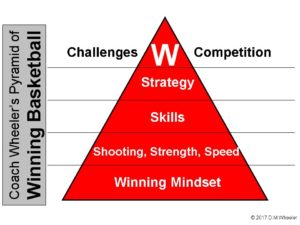with Coach Dave Wheeler
Taking over a losing team is like inheriting a ship with holes in the hull—it’s taking on water, it’s slow, and it feels like it’s on the verge of sinking. As a coach, you’re tasked with not only plugging those holes but also getting that ship moving swiftly toward victory. It’s not a small challenge. The team comes with bad habits, weak skills, and mental control issues—focus, emotional control, frustration, anger—all of which have kept them anchored in a cycle of losing. Their effort and conditioning levels are probably less than ideal, too.

But let’s be clear: losing sucks. There’s no sugar-coating it. Whether you’re a coach or an athlete, repeated losses can be demoralizing, leading to doubt and frustration. The temptation to give up is real, but the journey from a losing culture to a winning one is not just possible—it’s achievable if you commit to a structured approach. This journey can be broken down into what I call “The Levels of Winning,” a progressive roadmap that takes a team from the depths of defeat to the heights of consistent victory.
Level C:
Improving Focus, Conditioning, and Skills
The first step in transforming a losing team is to focus on the fundamentals: Mental Focus, Conditioning, and Key Skills. At this stage, the goal is not necessarily to win games but to set the foundation for future success.
Mental Focus
One of the most critical issues in a losing team is a lack of focus. Players may have developed bad habits, such as not listening during practice, losing concentration during games, or getting easily distracted by emotions or external factors. As a coach, your first priority is to instill a sense of discipline and concentration in your players. This can be achieved through structured practices that emphasize attention to detail and mental toughness. For instance, drills that require players to react quickly to changing situations can help improve focus and decision-making.
Conditioning
Another common issue with losing teams is poor conditioning. A team that lacks endurance will falter in the final minutes of a game, no matter how well they play initially. Improving conditioning is non-negotiable. This involves not only physical training but also mental conditioning—teaching players to push through fatigue and stay mentally sharp when they’re physically exhausted. Implementing high-intensity interval training (HIIT) or endurance-based drills can help build the physical stamina required for sustained performance.
Skills Development
At this level, skill development is about going back to basics. This might mean re-teaching fundamental techniques like shooting, passing, dribbling, or defending. It’s crucial to ensure that players are not just participating in drills but are also understanding the “why” behind each exercise. Skills are developing when players start executing in games what they’ve been learning in practice—whether it’s successfully running plays, applying pressure defense, executing fast breaks, or setting effective traps.
As a coach, it’s essential to celebrate small victories at this stage. When a player successfully executes a new skill in a game, it’s a sign of progress. These moments build confidence and create a positive feedback loop, encouraging further effort and improvement.
Level B2:
Competitive Effort
Once the team has made progress in focus, conditioning, and skills, they often find themselves in close games. They may still lose more than they win, but there’s a noticeable shift—they’re competitive. This stage is characterized by increased effort and the ability to win parts of the game, such as a quarter or a half, even if the overall result is a loss.
Good Effort
At Level B2, effort is no longer a sporadic occurrence but a consistent theme. Players are beginning to take pride in their work ethic, pushing themselves and each other to higher standards. They’re competing hard every minute of every game, regardless of the score. This competitive effort is the foundation upon which winning is built. It’s about teaching the players that success isn’t just about the final score—it’s about winning each moment, each possession.
Winning Parts of the Game
Although the team may still lose, they begin to win quarters or halves. This is a significant milestone because it shows that the team is capable of executing a game plan effectively for extended periods. The challenge at this level is to maintain focus and effort throughout the entire game, rather than just in spurts. Coaches should emphasize the importance of consistency and perseverance, reminding players that winning quarters is the first step toward winning games.
Level B1:
Over the Hump
This is the stage where a team begins to experience more frequent success. They’ve “overcome the hump” and start to win close games that they might have lost before. Confidence begins to build, and with it, a crucial shift in mentality occurs—the team starts to believe they can win, even in high-pressure situations.
Winning Close Games
At Level B1, the team has learned how to handle crunch time. They no longer crumble under pressure; instead, they thrive in it. Winning close games is a skill in itself, requiring not only physical execution but also mental toughness and strategic awareness. Players must trust each other and their ability to perform in critical moments. Coaches should focus on situational practices—like late-game scenarios—to ensure the team is prepared for anything that comes their way during a game.
Crunch Time Confidence
Confidence is the key to success at this level. A team that believes in its ability to win is dangerous. This confidence is built through experience—by repeatedly finding themselves in tight situations and learning how to navigate them successfully. It’s important for the coach to reinforce this confidence by highlighting past successes and encouraging players to trust their training and instincts.
Level A:
Consistent Winning
Reaching Level A is the ultimate goal—a stage where winning becomes a habit rather than an exception. At this level, the team not only wins but does so convincingly. You are blowing out opponents by 20+ points and doing so consistently.
Blowouts and Dominance
When a team reaches Level A, they’re not just winning—they’re dominating. Blowouts happen when a team is firing on all cylinders—offense, defense, and everything in between. The team has developed a winning culture, and the players expect to win every time they step on the court. This mindset shift is critical. The fear of losing is replaced by the expectation of victory, which drives the team to perform at a high level consistently.
Maintaining Consistency
Consistency is the hallmark of a winning team. It’s not about peaking for one game but about sustaining a high level of performance across the entire season. This requires relentless effort in practice, continuous skill development, and unwavering mental toughness. Coaches should keep pushing the team, reminding them that there’s always room for improvement, even when they’re winning consistently.
The Bottom Line: Don’t Give Up
Turning around a losing program is never easy. It’s a process that requires patience, perseverance, and an unwavering belief in the potential of the team. There will be setbacks, moments of doubt, and possibly an extended period of losing. But as long as you stay committed to the process and keep pushing your players to improve, the wins will come.
Win or Learn
One of the most important lessons to impart to your team is the concept of “Win or Learn.” In the early stages, when losses are more common than wins, it’s crucial to frame each game as a learning opportunity. What went well? What needs to be improved? By focusing on continuous improvement, rather than just the outcome, you help your players develop a growth mindset—a belief that they can always get better with effort and practice.
Set Clear Expectations
From day one, it’s essential to set clear expectations for your team. These expectations should cover everything from effort and attitude to punctuality and respect. By establishing a standard for everything, you create a culture of accountability and discipline. Rules are important, but standards are what sustain a winning culture. These standards should apply to everyone—no exceptions. When players understand that everyone is held to the same standard, they’re more likely to buy into the program and push themselves to meet those expectations.
Some Final Words from Coach…
“The Levels of Winning” is not just a theoretical framework; it’s a roadmap to success. By focusing on improving focus, conditioning, and skills, cultivating competitive effort, learning to win close games, and finally achieving consistent dominance, a coach can transform a losing team into a powerhouse. But remember, this transformation doesn’t happen overnight. It takes time, hard work, and a steadfast belief in the process.
As a coach, your job is to guide your team through these levels, celebrating the small victories along the way and never giving up—even when the going gets tough. Because in the end, it’s not just about winning games—it’s about building a culture of excellence, where every player strives to be their best, both on and off the court. And that’s the real victory.
About the Author:
Coach Dave Wheeler

Coach Dave Wheeler is a seasoned basketball coach with a proven track record of developing top-tier talent across multiple levels of the sport. Recognized as the #1 basketball development coach in Montana for the past two consecutive years by Coachup.com, Coach Wheeler has honed his craft through extensive experience at the middle school, high school, AAU, and college levels.
His expertise in building winning programs is well-regarded, making him a sought-after coach for teams looking to turn their fortunes around. Currently, Coach Wheeler is in the process of interviewing for his next head coaching position (2024-25 season) in the Bozeman / Belgrade / Livingston, Montana area where he aims to bring his winning philosophy and experience to a new team that is hungry for success.
Coach Wheeler can be contacted by leaving a comment below. He sees all comments and looks forward to hearing from you.

